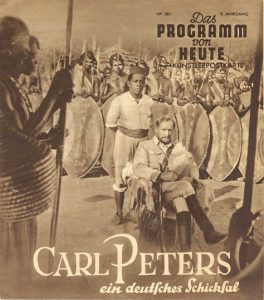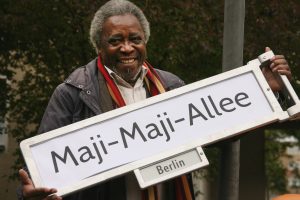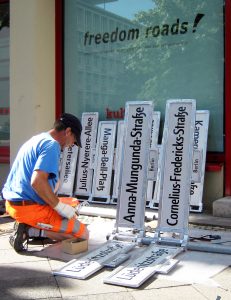Street Names

Not only on graves and monuments, but also in street names, Berlin still honours colonial actors who were involved in serious crimes in the former “Deutsch-Ostafrika”. First and foremost, the “Petersallee” in the so-called African Quarter in Wedding (Berlin Mitte district), which has been controversial for over three decades, should be mentioned. The street was originally called London Street. In 1939, shortly before the war began, it was renamed by the National Socialists. Obviously, in the largest German colonial quarter, one should not be reminded of the capital of the imperial rival. Instead, now Carl Peters (1856-1918) was honoured, the founder of the colony “German East Africa”, who at the Kilimanjaro is until today notorious as “mkono wa damu” (hand with blood). In his deeds and works the National Socialists saw a forerunner of their racist and imperialist ideology.
After a questionable “rededication” in 1986, in which the name “Petersallee” was left unchanged and only the additional sign “Prof. Dr. Hand Peters, City Councillor (1896-1966)” was attached, the decision to rename the street was finally made in 2016.

Since 2018 it is also certain that one part of the avenue will be called “Maji-Maji-Allee” in the future. In doing so, the district office followed a proposal of the Decolonize Berlin alliance and of Berlin Postkolonial who have been committed to decolonial street renaming for years. In the future, the street will thus commemorate the biggest war of resistance ever waged against the German colonial regime. In the south of present-day Tanzania, more than 20 communities had risen together against their oppressors from Germany in 1905-07 after drastic tax increases and coercive measures. What they had in common was that they had been given holy maji (Kiswahili: water), from which they hoped for protection against the bullets of the Germans. In the so-called Maji-Maji War, more than 100,000 East African children, women and men lost their lives.
Colonial officer Hermann Wissmann (1853-1905) is also honoured twice in Berlin with street names. As early as 1890 the “Wissmannstraße” in Rixdorf (district of Berlin-Neukölln) was named, the one in Grunewald followed eight years later. In 1884/85, Wissmann had travelled through the Congo as a colonizer on behalf of the notorious ruler Leopold II, acquiring, among other things, numerous important cultural objects that can still be found in Berlin museums and their depots.

With the street naming, however, the city fathers paid tribute above all to the Imperial Commissioner for D e u t s c h -O s t a f r i k a , appointed by Bismark, who in 1888 assembled the first German colonial army (later to become the “Kaiserliche Schutztruppe”). With its support Wissmann broke the resistance of the Swahili coastal population and submitted against all orders also the inhabitants of wide East African inland areas. Berlin nevertheless celebrated the brutal army commander as a war hero. Kaupert’s “Straßenführer durch Berlin” ignores this fact and instead ranks him to this day among the “most daring and successful African explorers”.
The districts of Neukölln and Charlottenburg/Wilmersdorf have now decided to initiate renaming processes. Berlin Postkolonial proposes the independence politician Lucy Lameck or the Ngoni ruler Nkomanile as possible new name givers for the Neukölln Wissmannstrasse. Nkomanile was the only woman among more than 60 Wangoni leaders who were hanged by the Germans during the Maji-Maji War in Songea in East Africa in February 1906. Today a women’s initiative in southern Tanzania is named after her.
Media Review
LoNam, 28.02.2018 “Maji-Maji-Allee statt Ehrung von Carl Peters”
taz, 1.03.2018 “Maji-Maji-Allee statt Ehrung von Carl Peters”
Tagesspiegel, 2.03.2018 “Eine Maji-Maji-Allee fürs Afrikanische Viertel?”
Deutschlandfunk, 22.03.2018 “Ein Symbol der Wiedergutmachung”
taz, 1.07.2018 “Neukölln räumt postkolonial auf”
Tagesspiegel, 15.03.2019 “Wie geht man mit Straßennamen um”
taz, 24.07.2019 “Gedenken auf dem Gehweg”
Deutschlandfunk Kultur, 7.08.2019 “Wie in Berlin um die Strassennamen gestritten wird”
Werkstatt der Kulturen, 2005
freedom roads: Ausführliche Liste deutscher Straßen mit kolonialem Bezug
Stadt neu lesen: „Petersallee“
Stadt neu lesen: „Wissmannstraßen“
Bezirksamt Mitte von Berlin
